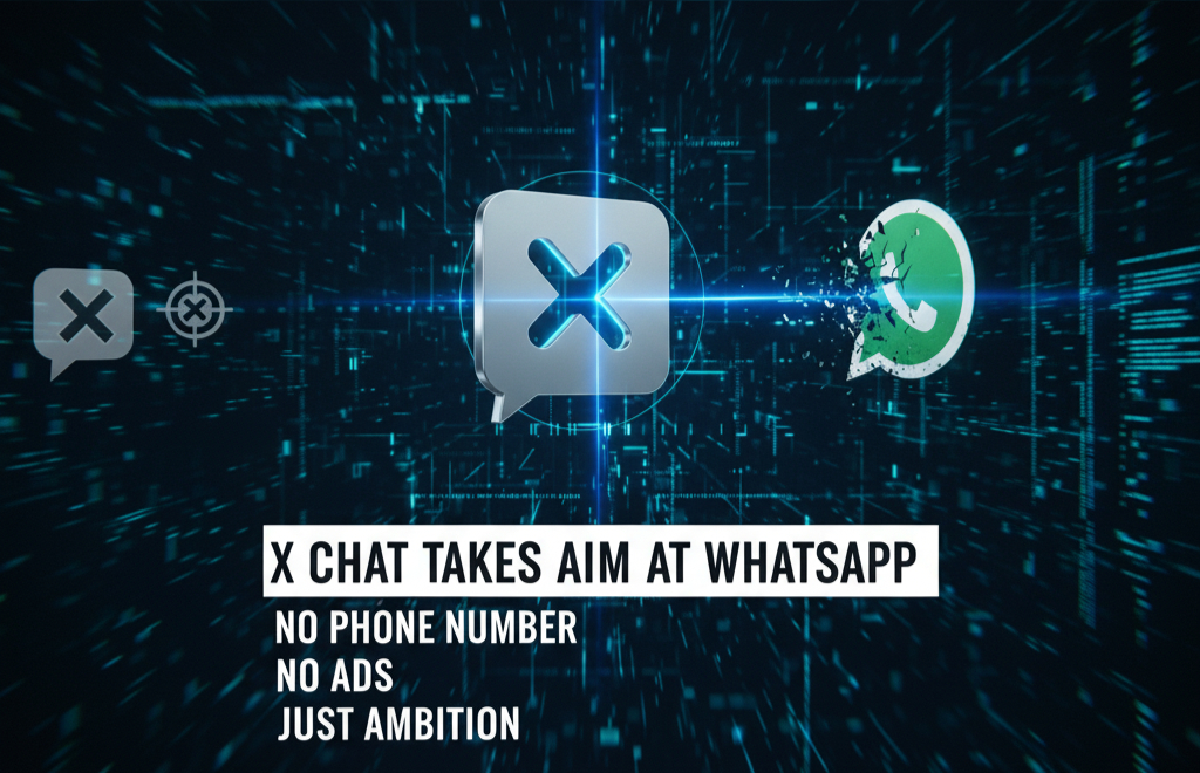In a recent Joe Rogan Experience podcast episode (#2404), released on October 31, 2025, Elon Musk detailed X Chat—not a minor update to Twitter DMs, but a completely rebuilt messaging platform designed to compete directly with WhatsApp and Telegram. Built on Rust with peer-to-peer encryption similar to Bitcoin’s cryptographic approach, X Chat offers vanishing messages with screenshot notifications, file sharing of any type (photos, videos, documents, GIFs), audio and video calls, and one feature that stands out: you don’t need a phone number to use it.
Currently in beta for X Premium subscribers and integrated into the X app, with a standalone version expected in the coming months with cross-platform support for iOS, Android, and web, X Chat represents Musk’s most direct challenge yet to the established messaging giants. And judging by the features he outlined, he’s not just competing—he’s trying to redefine what secure messaging should look like.
No Phone Number, Different Rules#
That “no phone number” detail is more significant than it sounds. WhatsApp, Telegram, Signal—they all tie your account to a phone number, which means giving up yet another piece of personal information. X Chat uses your X account instead, reducing personal data exposure and eliminating the need to share your phone number with anyone you message.
For privacy-conscious users, this matters. Phone numbers are tied to real identities, used for two-factor authentication across services, and increasingly targeted by SIM-swapping attacks. By decoupling messaging from phone numbers, X Chat removes a significant vulnerability. Whether users will trust X with their messaging after years of relying on dedicated platforms is another question entirely.
Bitcoin-Style Encryption: Marketing or Method?#
Musk describes X Chat’s encryption as “peer-to-peer based, similar to Bitcoin,” emphasizing strength without diving into technical specifics. This framing has sparked debate among security experts. Bitcoin doesn’t use traditional encryption—it relies on public key cryptography and digital signatures for security. Whether Musk means X Chat uses a truly decentralized peer-to-peer architecture or simply robust public-key cryptography isn’t entirely clear from his description. If implemented as a fully decentralized P2P system, it could minimize server-side vulnerabilities, unlike centralized apps where messages pass through company servers.
What is clear is the intent: this is supposed to be secure, decentralized, and resistant to surveillance. Musk frames X Chat as “the least insecure” messaging system—an unusually honest acknowledgment that no platform is perfectly secure, but a commitment to rigorous testing and making it as difficult as possible to compromise. Whether that’s refreshing honesty or careful hedging depends on your perspective, but it’s a more realistic claim than promising unbreakable security.
The proof will come from independent security audits and third-party scrutiny. Features described in a podcast don’t validate implementation quality. Until cryptography experts can examine the actual protocols and code, the “Bitcoin-style” claim remains aspirational rather than verified.
Zero Advertising Hooks, Zero Compromise#
Here’s where Musk’s pitch becomes most pointed. On the podcast, he explained that platforms like WhatsApp include what he calls “hooks for advertising”—mechanisms that analyze your messages to determine what ads to show you. His argument is straightforward: if the system knows enough to target ads, that’s a massive security vulnerability. If there’s a hook for advertising, someone can use that same hook to access your messages.
X Chat eliminates this entirely. No advertising hooks. No ad targeting. No data harvesting. No backdoors disguised as business features. Musk emphasized they’re testing it thoroughly and there are “no hooks in the X system for advertising,” promising “zero compromise” on privacy. If that commitment holds, it’s a meaningful privacy stance—especially coming from a for-profit company that traditionally relies on advertising revenue.
But that raises an obvious question: how does X monetize messaging? Right now, X Chat is available to Premium subscribers as part of X’s subscription model, suggesting a non-ad-based approach for messaging. That’s sustainable if adoption reaches critical mass. If it doesn’t, will business pressure introduce “optional” features that compromise the no-ads principle? Signal has maintained its privacy-first approach for years, but it operates as a nonprofit. X is a for-profit company with revenue expectations and stakeholder demands.
The Everything App Vision#
X Chat isn’t just about competing with WhatsApp. It’s part of Musk’s broader strategy to transform X into an “everything app” like China’s WeChat—messaging, payments, social networking, all integrated into one platform. X Chat is a foundational piece of that vision, sitting alongside existing features like posts, payments, and eventually commerce.
The question is whether Western users actually want everything in one place. WeChat succeeded in China partly because it filled a void and integrated into daily life before alternatives became entrenched. In Western markets, users already have established habits: WhatsApp for messaging, PayPal or Venmo for payments, Instagram or X for social networking. Consolidating all of that requires overcoming not just technical challenges but deeply ingrained user behavior. However, privacy regulations like GDPR could aid X Chat’s appeal by highlighting data protection concerns with incumbent platforms.
X Chat does have one major advantage: X’s existing user base. With over 600 million users already on the platform, X Chat doesn’t need to bootstrap adoption from zero. It’s already integrated into an app people use daily. That lowers the barrier significantly compared to launching a standalone messaging app and convincing people to download yet another application.
But integration cuts both ways. If users see X primarily as a social media platform, will they trust it for private conversations? Messaging apps depend on trust—trust that messages stay private, trust that the platform won’t change policies, trust that your data won’t be monetized later. X’s reputation on those fronts is… mixed.
Adoption Is Everything#
Messaging apps live or die by network effects. You use WhatsApp because everyone else does. Your family is on there. Your coworkers use it. Your group chats have years of history. Switching to a new platform means convincing everyone you communicate with to switch, too. That’s exponentially harder than building better technology.
X Chat might have superior privacy features, vanishing messages, no phone number requirement, and zero advertising hooks. But if your contacts aren’t using it, those features don’t matter. Musk needs to convince not just early adopters and privacy advocates, but mainstream users—people who don’t think about encryption protocols or advertising vulnerabilities, they just want to message their friends.
The standalone app, launching in a few months, will be the real test. Integrated into X, Chat can piggyback on existing usage patterns. As a standalone app competing directly with WhatsApp and Signal, it needs to prove it can stand on its own. That means intuitive UX, reliable performance, cross-platform compatibility, and features that make switching worth the hassle.
Early reactions on X are mixed. Some praise the privacy commitments and no-phone-number approach, with users commenting they “can’t wait for X Chat.” Others demand independent security audits before trusting Musk’s claims, questioning whether the encryption is truly robust. Many are simply skeptical that X Chat will gain enough traction to dethrone WhatsApp’s billions of users.
Ambition Meets Execution#
X Chat addresses real privacy problems in mainstream messaging. The no-advertising-hooks commitment, if it holds, eliminates a legitimate security concern. The no-phone-number approach reduces data exposure. The peer-to-peer encryption, assuming it’s implemented correctly, provides strong security guarantees. These are meaningful differentiators.
But messaging is crowded, competitive, and unforgiving. Users have high expectations and low tolerance for friction. X Chat needs to work flawlessly, stay secure under scrutiny, and maintain its privacy commitments even when business pressures mount. Whether Musk can deliver on all three remains to be seen.
The features sound right. The vision is clear. As the standalone app launches, user feedback and independent security audits will reveal if X Chat truly disrupts the messaging space—or becomes another ambitious feature struggling for adoption.


